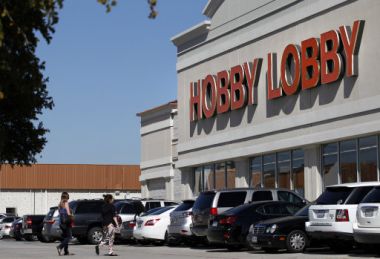Obamacare religious freedom challenge goes to Supreme Court

The US Supreme Court agreed this week to hear the case of the retail chain Hobby Lobby and the Conestoga Wood Specialties who are bringing a challenge against the Affordable Care Act on the grounds of religious freedom.
Hobby Lobby, a chain of 500-plus arts and crafts stores, and Conestoga, a Pennsylvania-based woodworking business run by a Mennonite family, both have strong religious ethics running through them.
In a briefing to the court, Conestoga Wood Specialties said they "integrate their faith into their daily lives, including their work".
Hobby Lobby does not sell shot glasses, is closed on Sundays, and funnels large portions of its profits into ministries across the US.
On its website, the company describes one of its commitments as "honouring the Lord in all we do by operating the company in a manner consistent with biblical principles".
Both companies are arguing that the Affordable Care Act (ACA) – or Obamacare as it is more commonly known - is a violation of their religious freedom, as outlined in the first amendment of the US constitution and the Religious Freedom Restoration act of 1993.
The ACA requires that any company with over 50 employees must provide a healthcare insurance plan for women that includes contraceptives. However both organisations argue that the contraceptives in question - certain types of intrauterine devices and post-coital oral contraceptives - terminate pregnancies rather than merely preventing them.
Since they consider such terminations to be sinful, they regard the state compelling them to pay for them as an infringement of their religious liberty.
If their case succeeds, it would be a landmark in giving a company access to the same religious freedom rights as individuals, something currently unprecedented.
"Corporations don't pray … they don't have a religious conscience," David Gans of the Constitutional Accountability Center was quoted as saying by USA Today in relation to the case. "These are all human attributes that don't apply to corporations."
However, in the case of Citizens United vs Federal Election Commission in 2010, the Supreme Court ruled that organisations have free speech and thus struck down government restrictions on corporate and union political advertising, setting a potential precedent for a broader interpretation of corporate rights.
A victory for Hobby Lobby could have wider consequences for healthcare provision under the ACA.
Marcia Greenberger, co-president of the National Women's Law Centre, has suggested that other forms of health care provision could be dropped by companies on religious freedom grounds including end-of-life care and coverage for treatment of HIV/AIDS.
The US solicitor general's office pointed out in the same USA Today article that a victory for the companies could potentially transform religious freedom laws "from a shield for individuals and religious institutions into a sword used to deny employees of for-profit commercial enterprises the benefits and protections of generally applicable laws".
Other cases are pending, following the Hobby Lobby and Conestoga judgement. On October 15, the Thomas More Society had petitioned the Court to review and reverse the Sixth Circuit US Court of Appeals decision regarding Michigan-based car parts manufacturer Autocam.
John Kennedy, chief executive of the family-owned company, is a devout Roman Catholic and holds the view that contraception, abortion, and sterilisation are wrong. The company argues that unless an exemption is made, it will be required to pay for services for employees with which it fundamentally disagrees.
Although the Autocam case is not going to be contested by the Thomas More Society at the Supreme Court, the society's president and chief counsel Tom Brejcha is fully supportive of the legal challenge being brought by Hobby Lobby and Conestoga.
"We are pleased that the US Supreme Court has agreed to review the Hobby Lobby and Conestoga cases and are confident that the Justices will recognise the intrinsic and constitutionally protected right of each American to freely exercise his or her religious faith - not only in worship - but in all aspects of American life, public or private, personal or business," he said.
"Disregard for the freedoms that birthed this nation would be a grave danger to the very fabric of America."
He added: "We are counting on the US Supreme Court to affirm that people of faith must not be coerced to check their religious liberties at the door when they enter the commercial marketplace. This is a basic right for all Americans."











